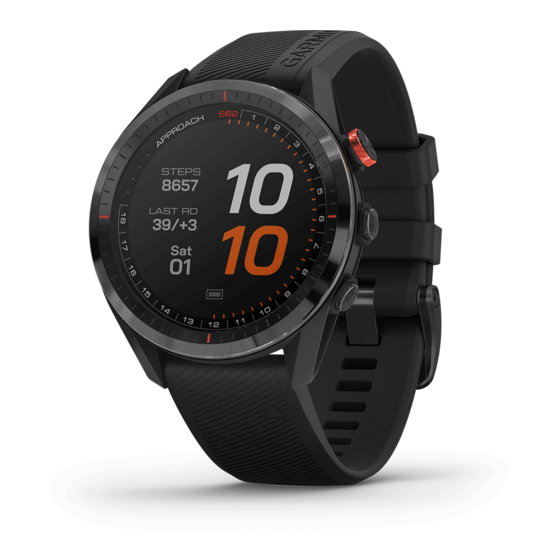Garmin APPROACH S62 Panduan Pemilik - Halaman 12
Jelajahi secara online atau unduh pdf Panduan Pemilik untuk Menonton Garmin APPROACH S62. Garmin APPROACH S62 24 halaman.
Juga untuk Garmin APPROACH S62: Panduan Pemilik (24 halaman)

Viewing Widgets
Your device comes preloaded with several widgets, and more
features are available when you pair your device with a
smartphone.
• From the watch face, swipe up.
• Tap the touchscreen to view additional options and functions
for a widget.
Customizing the Widget Loop
1
From the watch face, swipe up.
2
Select Edit.
Enabled widgets appear in the list with a
widgets appear in the list with a
3
Select an option:
• To add a widget, select
• To remove a widget, select
• To reorder the loop, tap an enabled widget name, scroll to
the desired location, and select
Heart Rate Variability and Stress Level
Your device analyzes your heart rate variability while you are
inactive to determine your overall stress. Training, physical
activity, sleep, nutrition, and general life stress all impact your
stress level. The stress level range is from 0 to 100, where 0 to
25 is a resting state, 26 to 50 is low stress, 51 to 75 is medium
stress, and 76 to 100 is a high stress state. Knowing your stress
level can help you identify stressful moments throughout your
day. For best results, you should wear the device while sleeping.
You can sync your device with your Garmin Connect account to
view your all-day stress level, long-term trends, and additional
details.
Using the Stress Level Widget
The stress level widget displays your current stress level and a
graph of your stress level for the last several hours. It can also
guide you through a breathing activity to help you relax.
NOTE: You may need to add the widget to your widget loop
(Customizing the Widget Loop, page
1
While you are sitting or inactive, swipe up to view the stress
level widget.
2
Tap the widget to begin measuring.
TIP: If you are too active for the watch to determine your
stress level, a message appears instead of a stress level
number. You can check your stress level again after several
minutes of inactivity.
3
Swipe up to view a graph of your stress level for the last
several hours.
Blue bars indicate periods of rest. Yellow bars indicate
periods of stress. Gray bars indicate times that you were too
active to determine your stress level.
4
To start a breathing activity, swipe up, and select Yes.
Body Battery
Your device analyzes your heart rate variability, stress level,
sleep quality, and activity data to determine your overall Body
Battery level. Like a gas gauge on a car, it indicates your
8
, and disabled
.
.
.
.
8).
amount of available reserve energy. The Body Battery level
range is from 0 to 100, where 0 to 25 is low reserve energy, 26
to 50 is medium reserve energy, 51 to 75 is high reserve energy,
and 76 to 100 is very high reserve energy.
You can sync your device with your Garmin Connect account to
view your most up-to-date Body Battery level, long-term trends,
and additional details
(Tips for Improved Body Battery Data,
page
8).
Viewing the Body Battery Widget
The Body Battery widget displays your current Body Battery
level and a graph of your Body Battery level for the last several
hours.
NOTE: You may need to add the widget to your widget loop
(Customizing the Widget Loop, page
1
Swipe up to view the Body Battery widget.
2
Tap the widget to view a graph of your body battery level for
the last several hours.
3
Swipe up to view a combined graph of your Body Battery and
stress level.
4
Swipe up to view your Body Battery data since midnight.
Tips for Improved Body Battery Data
• Your Body Battery level updates when you sync your device
with your Garmin Connect account.
• For more accurate results, wear the device while sleeping.
• Rest and good sleep charge your Body Battery.
• Strenuous activity, high stress, and poor sleep can cause
your Body Battery to drain.
• Food intake, as well as stimulants like caffeine, has no
impact on your Body Battery.
Heart Rate Features
The Approach S62 device has a wrist-based heart rate monitor
and is also compatible with chest heart rate monitors (sold
separately). You can view heart rate data on the heart rate
widget. If both wrist-based heart rate and chest heart rate data
are available when you start an activity, your device uses the
chest heart rate data.
Wrist-based Heart Rate
Wearing the Device
• Wear the device above your wrist bone.
NOTE: The device should be snug but comfortable. For more
accurate heart rate readings, the device should not move
while running or exercising. For pulse oximeter readings, you
should remain motionless.
NOTE: The optical sensor is located on the back of the
device.
• See
Tips for Erratic Heart Rate Data, page 9
information about wrist-based heart rate.
• See
Tips for Erratic Pulse Oximeter Data, page 10
information about the pulse oximeter sensor.
• For more information about accuracy, go to
/ataccuracy.
8).
for more
for more
garmin.com
Heart Rate Features
